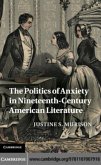In confronting their tumultuous time, antebellum American writers often invoked unrevealable secrets. Five of Ralph Waldo Emerson's most inventive interlocutors - Melville, Hawthorne, Dickinson, Douglass and Jacobs - produced their most riveting political thought in response to Emerson's idea that moods fundamentally shape one's experience of the world, changing only through secret causes that no one fully grasps. In this volume, Dominic Mastroianni frames antebellum and Civil War literature within the history of modern philosophical skepticism, ranging from Descartes and Hume to Levinas and Cavell, arguing that its political significance lies only partially in its most overt engagement with political issues like slavery, revolution, reform, and war. It is when antebellum writing is most philosophical, figurative, and seemingly unworldly that its political engagement is most profound. Mastroianni offers new readings of six major American authors and explores the teeming archive of nineteenth-century print culture.
Dieser Download kann aus rechtlichen Gründen nur mit Rechnungsadresse in A, B, BG, CY, CZ, D, DK, EW, E, FIN, F, GR, HR, H, IRL, I, LT, L, LR, M, NL, PL, P, R, S, SLO, SK ausgeliefert werden.









